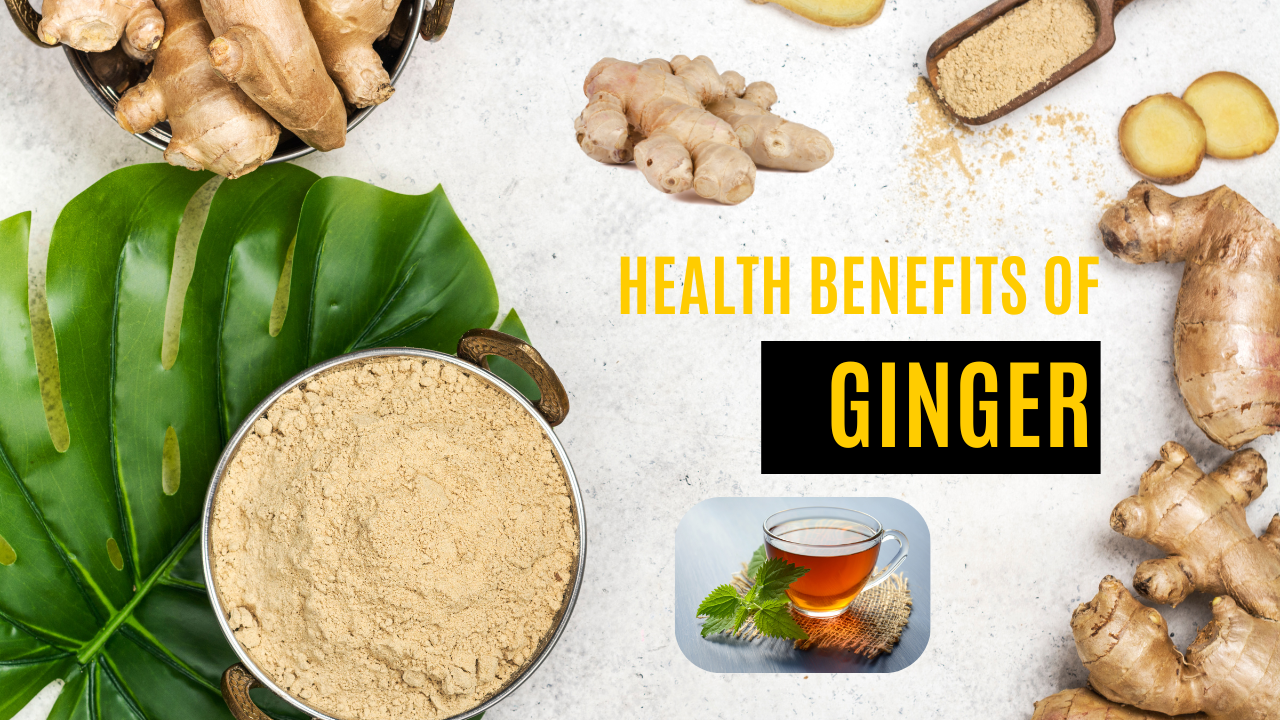Ginger, a spice that has been used for centuries, is more than just a flavor enhancer in dishes. It is packed with numerous health benefits that can significantly improve your overall well-being. From aiding digestion to boosting your immunity, ginger is truly a powerhouse herb. In this post, we’ll explore the various health benefits of ginger, and why it should be an essential part of your daily routine.
What is Ginger? A Root Full of Wellness

Ginger is a flowering plant whose root is commonly used in cooking and medicine. It belongs to the Zingiberaceae family and has a distinct, peppery flavor with a hint of citrus. The root, often referred to as the rhizome, contains compounds like gingerol, which contribute to its medicinal properties. Whether fresh, dried, or powdered, the health benefits of ginger are undeniable.
The Historical Use of Ginger in Medicine
Ginger’s medicinal use dates back over 5,000 years in various ancient cultures. In traditional Chinese medicine and Ayurveda, ginger was used to treat ailments like nausea, digestive issues, and respiratory problems. Over the centuries, people discovered its ability to reduce pain, inflammation, and support overall health. To this day, ginger remains a staple in natural healing practices worldwide, proving its lasting importance.
Nutritional Profile
Ginger is low in calories but rich in vitamins and minerals, making it an excellent addition to your diet. It contains essential nutrients like vitamin C, magnesium, potassium, and B vitamins. These nutrients play a crucial role in maintaining your health, while the active compounds in ginger, like gingerol, are responsible for many of its health benefits.
What Makes Ginger a Superfood?
Ginger is often considered a superfood due to its high concentration of bioactive compounds, especially gingerol, which is known for its anti-inflammatory, antioxidant, and antibacterial properties. The health benefits of ginger are attributed to these compounds, which help fight free radicals, reduce inflammation, and promote overall wellness. Additionally, its versatility in cooking makes it easy to incorporate into your diet.
Key Nutrients Found in Ginger
Ginger provides several key nutrients that benefit your body in various ways. Some of the essential nutrients found in ginger include:
- Gingerol – The active compound that provides anti-inflammatory and antioxidant benefits.
- Vitamin C – Supports the immune system and promotes skin health.
- Magnesium – Helps with muscle function and relaxation.
- Potassium – Regulates blood pressure and balances fluids in the body.
- B Vitamins – Support energy metabolism and help with brain function.
These nutrients make ginger a nutrient-dense food with many health benefits.
Health Benefits

1. Boosts Immunity: Your Shield Against Illness
One of the most well-known health benefits of ginger is its ability to boost the immune system. Ginger is rich in antioxidants that help fight off infections and keep your body resilient to illnesses. Regular consumption of ginger can help prevent colds, flu, and other common illnesses by strengthening the immune response.
2. Reduces Inflammation and Pain
Ginger is a natural anti-inflammatory agent. It contains gingerol, which helps reduce inflammation in the body and can be used to alleviate pain associated with conditions like arthritis, muscle pain, and even menstrual cramps. Its anti-inflammatory properties make ginger an effective remedy for chronic pain conditions.
3. Supports Digestive Health
Ginger has long been used to improve digestion and reduce symptoms of indigestion. It promotes the secretion of digestive juices and enhances the absorption of nutrients. Consuming ginger can help soothe an upset stomach, reduce bloating, and relieve gas. It also aids in speeding up the movement of food through the digestive tract, ensuring a healthy digestive system.
4. Relieves Nausea and Morning Sickness
Nausea is a common issue, especially during pregnancy. The health benefits of ginger are particularly noticeable in the relief it provides from nausea and vomiting. It’s commonly used to combat morning sickness in pregnant women, and it also helps alleviate motion sickness and nausea due to chemotherapy treatments.
5. Lowers Blood Sugar Levels
Studies suggest that ginger can help regulate blood sugar levels, making it beneficial for individuals with type 2 diabetes. The compounds in ginger may help improve insulin sensitivity and lower blood sugar levels, reducing the risk of diabetic complications.
6. Enhances Heart Health
Ginger has been shown to reduce cholesterol levels, lower blood pressure, and improve circulation, all of which contribute to better heart health. Regular consumption of ginger can help reduce the risk of heart disease and maintain overall cardiovascular health.
7. Aids in Weight Loss
For those looking to lose weight, ginger can be a great natural ally. It has been shown to promote fat burning and increase metabolism, making it easier for the body to shed excess weight. Ginger also helps in reducing appetite and improving digestion, both of which can support weight loss efforts.
8. Fights Off Respiratory Issues
Ginger’s ability to fight infections extends to respiratory health as well. It helps clear the airways, reduces inflammation in the lungs, and alleviates symptoms of asthma, bronchitis, and other respiratory conditions. Drinking ginger tea can provide relief from a cough or congestion.
9. Improves Brain Function and Fights Alzheimer’s Disease
The anti-inflammatory and antioxidant properties of ginger are beneficial for brain health. Studies suggest that ginger can enhance cognitive function, improve memory, and reduce the risk of age-related brain diseases like Alzheimer’s. Regular intake of ginger may help protect against neurodegenerative conditions and promote overall mental clarity.
10. Natural Remedy for Menstrual Pain
Menstrual cramps can be painful and disruptive. Ginger is a natural remedy for menstrual pain, offering relief from cramps and reducing discomfort. Studies have shown that taking ginger during menstruation can be as effective as some over-the-counter pain medications in alleviating cramps.
How to Use Ginger
Simple Ways to Incorporate Ginger into Your Diet
Ginger can be easily added to your diet in a variety of ways. You can add fresh ginger to smoothies, salads, soups, or stir-fries. Ground ginger can be sprinkled into baked goods, teas, or sprinkled over roasted vegetables. By incorporating ginger into your meals, you can enjoy its health benefits regularly.
Ginger Tea: A Natural Health Booster
One of the most popular ways to enjoy ginger is through ginger tea. Simply steep fresh ginger slices in hot water and add honey or lemon to taste. Ginger tea is a soothing drink that can be consumed daily to support digestion, boost immunity, and provide relief from nausea and pain.
Delicious Ginger Recipes You Can Try at Home
Here are a few ginger-based recipes to try at home:
- Ginger-Lemon Tea: A refreshing and health-boosting drink.
- Ginger Chicken Stir-Fry: A flavorful and nutritious meal.
- Ginger-Cinnamon Smoothie: A healthy breakfast drink packed with nutrients. These recipes allow you to enjoy the health benefits of ginger in different ways.
Safety and Side Effects
Who Should Avoid Ginger?
While ginger is safe for most people, some individuals may experience mild side effects such as heartburn or digestive discomfort. Pregnant women should consume ginger in moderation, as large amounts may lead to complications. People taking blood-thinning medications or those with gallstones should consult with their healthcare provider before using ginger.
Recommended Dosages for Best Results
For general health benefits, it’s recommended to consume 1-2 grams of ginger per day. This can be in the form of fresh ginger, powdered ginger, or ginger tea. However, if you’re using ginger for a specific health condition, it’s best to consult with a healthcare professional for the appropriate dosage.
Conclusion
Why Ginger Should Be Part of Your Daily Routine
The health benefits of ginger are far-reaching and can help improve your health in numerous ways. From boosting immunity to supporting digestion and relieving pain, ginger offers natural solutions for many common ailments. Incorporating ginger into your daily routine can help maintain overall health and vitality.
Unlocking the True Potential of Ginger for Health
Whether you consume it in the form of tea, add it to your meals, or use it as a supplement, ginger can be a powerful addition to your health regimen. By unlocking the potential of ginger, you can experience its full range of benefits and enjoy a healthier, more vibrant life or you can read more like this here.
FAQs About the Health Benefits of Ginger
1. What are the main health benefits of ginger?
Ginger is known for its anti-inflammatory, antioxidant, and digestive properties. It helps boost immunity, reduce nausea, relieve pain, improve heart health, and support weight loss. Additionally, it can improve brain function and combat respiratory issues.
2. Can ginger help with weight loss?
Yes, ginger aids weight loss by boosting metabolism, promoting fat burning, and reducing appetite. It also supports digestion, which is essential for maintaining a healthy weight.
3. Is ginger safe for pregnant women?
In moderation, ginger is safe for most pregnant women and is commonly used to relieve nausea and morning sickness. However, excessive consumption should be avoided. Pregnant women should consult their doctor before consuming ginger in large amounts.
4. How much ginger should I consume daily?
For general health benefits, 1-2 grams of ginger per day is recommended. This can be consumed in the form of fresh ginger, powdered ginger, or ginger tea.
5. Can ginger help reduce menstrual pain?
Yes, ginger is a natural remedy for menstrual pain. Its anti-inflammatory properties help alleviate cramps and discomfort during menstruation.

